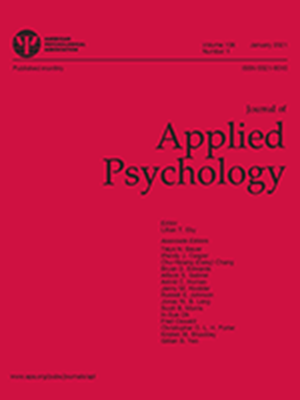通过积极主动的激励加强团队合作:一项干预研究。
IF 9.4
1区 心理学
Q1 MANAGEMENT
引用次数: 0
摘要
尽管在过去十年中,有关个人工作设计的文献大量涌现,但有关组织团队协作设计工作的研究却相对滞后,这一点令人惊讶,因为在当代工作中,以团队为基础的安排非常突出,而且团队的主动性在当今的商业环境中非常重要。本文借鉴积极主动动机理论和有关团队积极主动表现的文献,介绍了一项旨在提高团队积极主动动机的大规模干预研究,包括一个由 96 个团队和 1,077 名员工组成的前测/后测对照组。我们研究了团队主动积极性干预与干预后 6 个月和 1 年团队精心打造三个维度(任务团队精心打造、关系团队精心打造和认知团队精心打造)变化的相关程度。我们还研究了三个团队层面的团队协作变化在解释干预与团队绩效随时间推移的变化之间的关联方面所起的中介作用。我们的结果表明,干预与所有三种形式的团队协作变化都呈正相关。此外,团队协作的变化与干预 6 个月和 1 年后团队绩效的变化呈正相关。(PsycInfo Database Record (c) 2024 APA, 版权所有)。本文章由计算机程序翻译,如有差异,请以英文原文为准。
Enhancing team crafting through proactive motivation: An intervention study.
Although the literature on individual job crafting has proliferated over the past decade, research on the collaborative crafting efforts of organizational teams has lagged behind, which is surprising given the prominence of team-based arrangements in contemporary work and the importance of team proactivity in today's business environment. Drawing on proactive motivation theory and the literature on proactive performance in teams, this article presents a large-scale intervention study aimed at increasing team proactive motivation, including a pretest/posttest control group with 96 teams and 1,077 employees. We study the extent to which a team proactive motivation intervention is associated with changes in three dimensions of team crafting (task team crafting, relational team crafting, and cognitive team crafting) at both 6 months and 1 year after the intervention. We also examine the mediating role of change in the three team-level crafting dimensions in explaining the association between the intervention and change in team performance over time. Our results show that the intervention is positively associated with change in all three forms of team crafting. Furthermore, change in team crafting positively associates with change in team performance 6 months and 1 year after the intervention. (PsycInfo Database Record (c) 2024 APA, all rights reserved).
求助全文
通过发布文献求助,成功后即可免费获取论文全文。
去求助
来源期刊

Journal of Applied Psychology
Multiple-
CiteScore
17.60
自引率
6.10%
发文量
175
期刊介绍:
The Journal of Applied Psychology® focuses on publishing original investigations that contribute new knowledge and understanding to fields of applied psychology (excluding clinical and applied experimental or human factors, which are better suited for other APA journals). The journal primarily considers empirical and theoretical investigations that enhance understanding of cognitive, motivational, affective, and behavioral psychological phenomena in work and organizational settings. These phenomena can occur at individual, group, organizational, or cultural levels, and in various work settings such as business, education, training, health, service, government, or military institutions. The journal welcomes submissions from both public and private sector organizations, for-profit or nonprofit. It publishes several types of articles, including:
1.Rigorously conducted empirical investigations that expand conceptual understanding (original investigations or meta-analyses).
2.Theory development articles and integrative conceptual reviews that synthesize literature and generate new theories on psychological phenomena to stimulate novel research.
3.Rigorously conducted qualitative research on phenomena that are challenging to capture with quantitative methods or require inductive theory building.
 求助内容:
求助内容: 应助结果提醒方式:
应助结果提醒方式:


